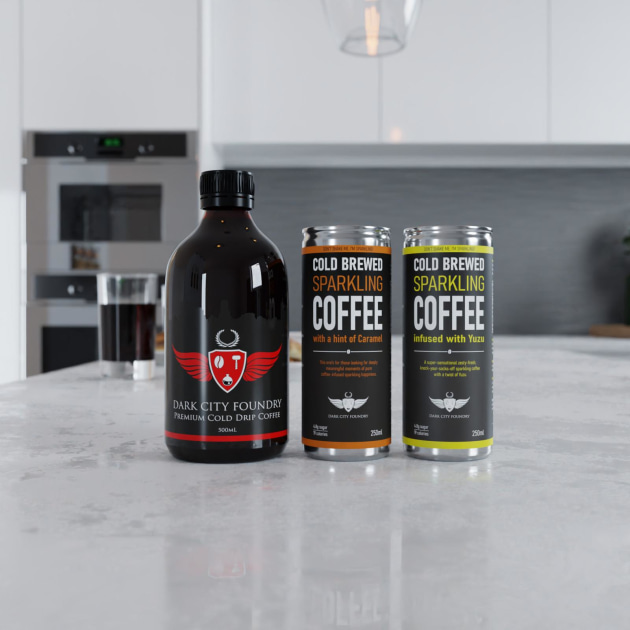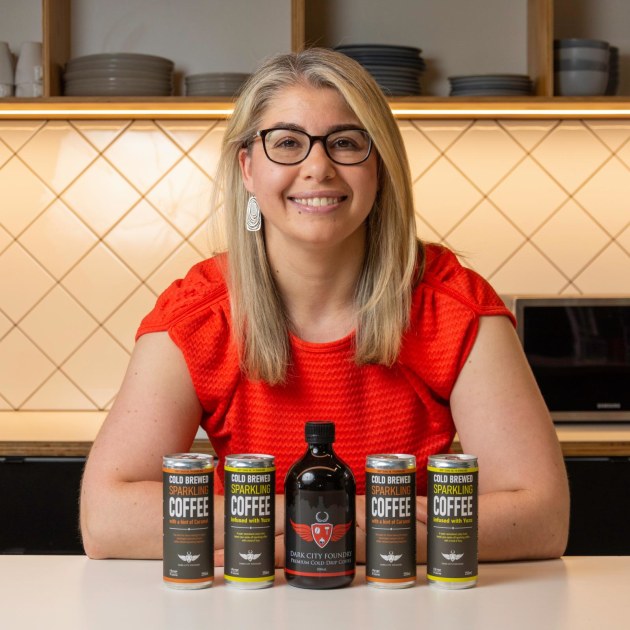From corporate marketer to founder of cold brew coffee label Dark City Foundry, Anita Brodian shares her career jump and entry into the dynamic beverages industry with Pippa Haupt.
Dark City Foundry founder Anita Brodian has been making cold drop coffee for more than 12 years, ultimately launching her own brand, Dark City Foundry, in 2018.
The sea change came about when Brodian found out she was dairy and soy intolerant – which began making her usual coffee difficult.
“At that time, the only non-milk options out there were long blacks or espressos. The day I added three teaspoons of sugar to my coffee and it was still bitter was enough to make me stop buying coffee out; the only problem was coffee,” says Brodian.
For Christmas that year, her husband gifted Brodian a cold drip coffee maker.
“I started making my own coffee, then began sharing it with my friends and that’s how the Dark City Foundry story started,” she explains.
Having worked in everything from product management to marketing communications during her career, Brodian says she woke up one day wishing for a new challenge.
“I was bored, and running a marketing department usually means you outsource all the fun stuff. I wanted to do the fun stuff,” says Brodian.

At first, she juggled her corporate career and building Dark City Foundry in her spare time, but soon realised her heart was with her own brand.
“I well and truly burned out at the end of year one, working weekends at markets and during the week in an office. I lived for market days when I got to meet and chat to customers.
“Soon after, a welcome redundancy meant I could go full-time on the business and of course drinking and making more coffee,” says Brodian.
The name Dark City Foundry is a homage to Melbourne, which Brodian calls home.
“Our coffee takes 10 hours to make, so while the city’s dark, we’re making coffee.”
She says the word ‘foundry’ is included in the name as it was historically a place where metal was forged to create metal products.
“These days the word is applied to many places that create things. We thought that the word embodied the idea of the physical labour that’s involved in all the steps from growing the coffee plant through to finally creating our cold drip coffee,” says Brodian.
If you look closely at the bottle labels – designed and made by Brodian – you can also see the night-time skyline of Melbourne in the background.
In terms of operations, the company does almost everything itself including brewing, marketing, logistics, and building an entire commercial brewing system.
Iced Coffee vs Cold Drip
When it comes to defining cold drip versus an iced coffee, Brodian says apart from both being cold, there are huge differences between coffee brewed for an iced coffee and the technique of cold dripping coffee. The variations are in the process and flavour, she says.
Dark City Foundry cold drips its coffee at 2°C and heat is not used in any part of the process. This means the bitter and acidic compounds in coffee beans are not extracted, resulting in a smoother, richer flavour with less acidity and more sweetness than a typical coffee extraction.
For cold drip, the production process takes 10 hours, gently extracting flavour from the coffee beans. Over that time, chilled, filtered water is slowly percolated through freshly ground coffee. The water flows through the coffee drip by drip, falling into a collection vessel.
Brodian's co-manufacturer is a ‘triple-threat’ by providing bottling, labelling, and canning.
The prerequisite for finding the right manufacturer was that it had to be locally based.
“For a lot of products, the co-manufacturer will actually do everything for the company. But we manufacture the cold drip coffee. Being local means we can transport the fresh brew to them in an hour and a half,” says Brodian.
Science of the brew
Brodian wanted to have all bases covered; most importantly, she wanted a shelf-stable, low sugar product. During R&D, Brodian worked with a food technologist.
“One of the things I always wanted was to have a product that was low in sugar, so we added caramel in one product and a little bit of coconut nectar without the lactose.”
“Our food technologist was extremely open and helpful with the process and its now one of those things that I feel very comfortable with because I understand it so well. There’s different challenges when you’re doing shelf stable products as opposed to refrigerated products, and understanding those challenges was quite important for us.”
“They also connected us to an ingredient supplier to source the products we needed; like caramel, yuzu and coconut nectar,” says Brodian.
Making the machine
“When we started talking about this project, we realised there was nothing off the shelf that you can buy that makes that much cold drip coffee. You can’t just find the equipment you need and where to buy it; so we had to build it ourselves.”
Brodian says her husband’s experience as a software engineer came in handy during the 12-month build of the brewing system.
“We leveraged some information from the beer brewing industry, which is probably the closest industry in terms of equipment to what we needed. My husband then did a lot of research and development, and created the software to run the system as well.
“We had a very specific flavour profile in mind that we wanted to achieve for the bottled version, so we spent a lot of time trying to make this flavour consistent,” says Brodian.
Sparkling horizons
November last year saw the addition of a bubbly new product to the Dark City Foundry range: sparkling coffee in a can, one infused with yuzu, and the other with caramel.
After devoting time to achieving the desired flavour of the Dark City Foundry’s cold drip coffee, Brodian says she wanted a new product that didn’t hide the distinct flavour.
“We spent a lot of time perfecting it, and we didn’t want to hide that behind dairy or oat milk. The sparkling water addition is fun and tasty, but most importantly you’re still getting the flavour of our coffee coming through,” says Brodian.

For 2023, the sparkling coffee will be the focus for the company, with plans to expand the team and operations, as well as scaling up business locally, with a long term goal of seeking out international markets in Asia and the US.
“A few years ago, canned coffee wasn’t commonplace, but now we have can have everything canned including water, and that’s going to open up a lot more opportunities.”
Reflecting on her own experience growing up with Armenian heritage, Brodian says she embraced difference, and applied this ethos to the company, never wanting to be the type of brand that was like everyone else.
“I was the kid at school who ate falafels and tahini when no one knew what they were – and now everyone eats it. It’s one of those things that I know makes it good to be different.”
“Slowly over time we’ve really developed our identity. We want to be seen as being different but also tasty at the same time,” says Brodian.
This article first appeared as the Rising Star feature in the February-March 2023 edition of Food & Drink Business magazine.








